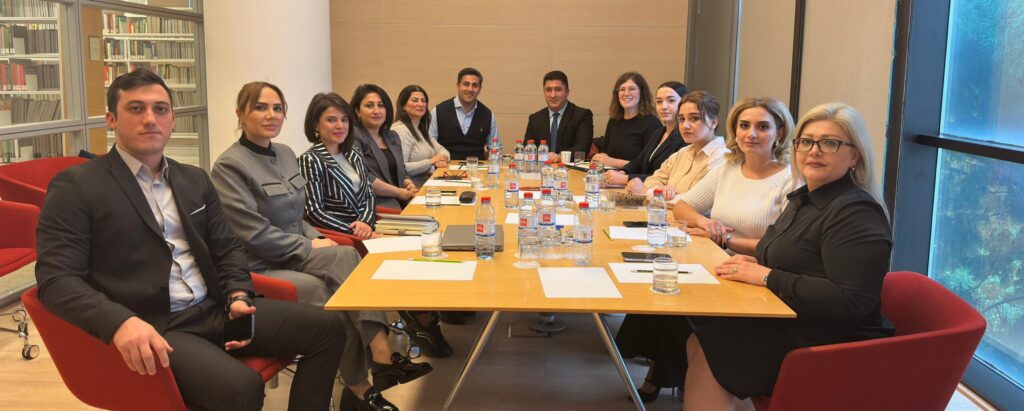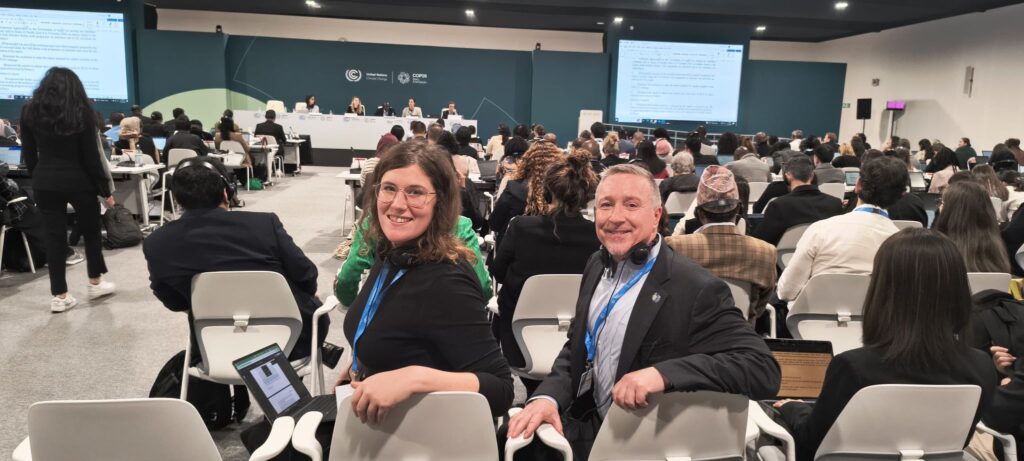COP29: Creating opportunities for libraries in climate action
29 November 2024
This November, IFLA attended the 29th UN Climate Change Conference (COP29) in Baku, Azerbaijan. As a non-party observer to the UN’s Framework Convention on Climate Change (UNFCCC) since 2023, IFLA has been steadily growing engagement in this key global policy space.
Have a look into our work in Baku!
Our COP29 goals:
- Create opportunities for our members and other libraries in Azerbaijan to connect
- Demonstrate IFLA’s commitment to implimenting Action for Climate Empowerment and Greening Education goals
- Identify strategic areas for future projects and partnerships
- Join partners from the culture sector to advocate for culture-based climate action
The Role of HEI Libraries in Contributing to Climate Research
We joined our member ADA University Library and university librarians from across Baku to discuss how higher education libraries make a huge impact on Climate Empowerment and Climate Transparency (read on for more!)
IFLA provided an overview of our engagement with climate action, and participants discussed their role in:
- Providing access to information and acquiring resources on climate-related issues that are important both in a local/national and international context
- Helping to set the research agenda and research policies and guidelines, including support on Open Science
- Supporting researchers, students and faculty
- Identifying opportunities to connect researchers to the private sector and public research needs
- Providing information to support the research and education needs of cultural and lingual minority groups

IFLA introduced our members at ADA University Library and other local universities to the National ACE Focal Point for Azerbaijan to further connection of their work to the national plans for climate empowerment.
- Find your country’s ACE Focal Point here.
Action for Climate Empowerment & Climate Transparency
One of IFLA’s core engagement areas within climate is ACE: Action for Climate Empowerment. This is a provision in both the UNFCCC and the Paris Agreement that requires Parties to invest in climate education, public participation, and access to information.
IFLA was able to share our activities with the UNFCCC Unit Lead on Gender, Children & Youth, and ACE, Ms Fleur Newman. In a panel discussion, she highlighted IFLA’s efforts to connect ACE Focal Points to our members as a success story, saying “this is what ACE is about”.
Emerging Opportunity: ACE Hub 2.0
At COP29, the ACE team announced the second iteration of the ACE Hub, in partnership with the government of the German State of North Rhine-Westphalia (NRW). Since 2022, the activities of the hub have included offering capacity building, tools and knowledge to governments and other stakeholders across the world and delivering workshops, webinars and networking events.
The Hub 2.0 will focus on peer to peer learning experiences and on sub-national implementation. IFLA will identify opportunities for libraries to get involved.
Advancing Climate Transparency
IFLA was able to immediately bring the outputs of our meeting with Azeri librarians to the conference through the ACE Presidency event on advancing climate transparency.
Climate Transparency refers to a requirement for Parties to provide clear and robust data and information on climate action. The UNFCCC’s efforts on Climate Transparency are intended to build trust, credibility and accountability on climate data.
Emerging Opportunity: Climate Transparency Framework
Parties to the Paris Agreement are required to submit biennial transparency reports (BTR) every two years, starting in December 2024. This includes a requirement to provide chapters on research and on education, training and public awareness.
This is an emerging opportunity to further recognition of the unique role of libraries as trusted information brokers. See the Baku Declaration on Global Climate Transparency for more.
Stay tuned for more on this!
Greening Education – Climate Literacy
As a member of the UNESCO Greening Education Partnership, IFLA attended the Ministerial Roundtable on Greening Education and enhancing climate literacy.
Ministers of Education from around the world met to express solidarity on enhancing climate literacy. This event stressed that climate education includes a good science education, but also the capacity for conceptual understanding, critical thinking, future thinking, and a can-do attitude.
IFLA calls for more recognition of the life-long and community-wide aspect of climate literacy – and education in general.
We urge more cooperation between national and municiple education authorities and library associations and institutions in order to foster relationships that secure better outcomes in national greening education strategies.
Culture in the Global Goal on Adaptation
IFLA joined partners to advocate for greater recognition of culture-based climate action in key outcome documents.

We joined the 2nd High-Level Ministerial Dialogue for Culture-Based Climate Action at COP29, and celebrated the increasing number of Parties joining the The Group of Friends for Culture-Based Climate Action at the UNFCCC (GFCBCA).
IFLA co-sponsored an official UNFCCC Side Event to advocate for more action on “Unlocking the Power of the Culture, Heritage & Knowledge Provisions of the Global Goal on Adaptation (GGA)”.
The GGA enhances the ability for communities to change and adapt to be more resilient and reduce vulnerability to climate change. IFLA stresses that this sort of system-change requires investment in public infrastructure, community-centres, education, and public participation in order to deliver culturally-appropriate adaption.
Our statements:
- The focus on education and a transversal enabler of the GGA must be lifelong and community-wide.
- Implementation strategies, and corresponding indicators, must recongise the role of non-formal education and cultural institutions.
- We must reach outside the culture sector and create the opportunity for all people to encounter, engage, and share in culture.
- We call for these actions to be visible, implementable, and measurable through national adaptation plans, policy instruments, and planning processes and/or strategies, and with appropriate indicators.
Unfortunately, the decisions made at COP29 did very little to recognise culture as a key driver of climate action. They did not advance efforts to have greater recognition of culture-based climate action at COP30, to be hosted by Brazil in 2025.
However, IFLA will continue working with partners from across the field to push for greater recognition of culture, heritage, public participation and lifelong learning in driving rights-based climate action and building a more sustainable future.
Our UN Climate Change Conference engagement this year was financed by a grant from the Stichting IFLA Global Libraries Foundation (SIGL).
Contact: Claire McGuire, [email protected]